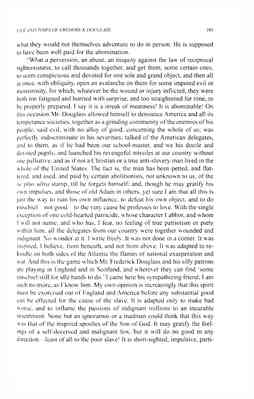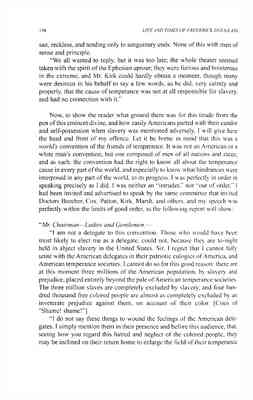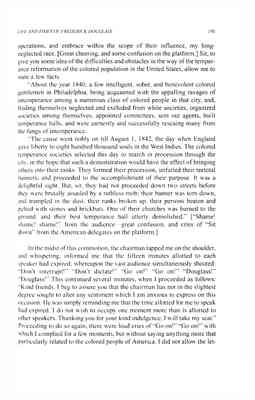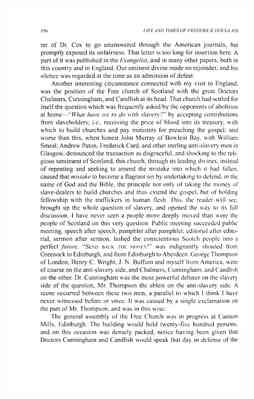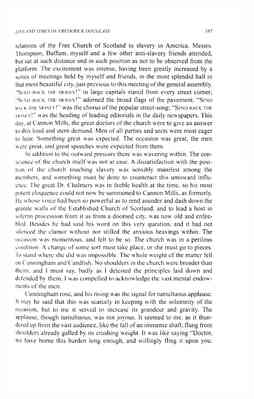Pages
41
LIFE AND TIMES OF FREDERICK DOUGLASS 193
what they would not themselves adventure to do in person. He is supposed to have been well paid for the abomination.
"What a perversion, an abuse, an iniquity against the law of reciprocal righteousness, to call thousands together, and get them, some certain ones, to seem conspicuous and devoted for one sole and grand object, and then all at once, with obliquity, open an avalanche on them for some imputed evil or monstrosity, for which, whatever be the wound or injury inflicted, they were both too fatigued and hurried with surprise, and too straightened for time, to he properly prepared. I say it is a streak of meanness! It is abominable! On this occasion Mr. Douglass allowed himself to denounce America and all its temperance societies, together as a grinding community of the enemies of his people; said evil, with no alloy of good, concerning the whole of us; was perfectly indiscriminate in his severities; talked of the American delegates, and to them, as if he had been our school-master, and we his docile and dernted pupils: and launched his re,engeful missiles at our country without une pallative, and as if not a Christian or a true anti-slavery man lived in the whole of the United States. The fact is, the man has been petted, and flattered, and used, and paid by certain abolitionists, not unknown to us, of the ne plus ultra stamp, till he forgets himself; and, though he may gratify his own impulses, and those of old Adam in others, yet sure I am that all this is just the way to ruin his own influence, to defeat his own object, and to do mischief—not good—to the very cause he professes to love. With the single exception of one cold-hearted parricide, whose character I abhor, and whom I will not name, and who has, I fear, no feeling of true patriotism or piety within him, all the delegates from our country were together wounded and indigniant. No wonder at it, I write freely. It was not done in a corner. It was inspired, I believe from beneath, and not from above. It was adapted to rekindle on both sides of the Atlantic the flames of national exasperation and war. And this is the game which Mr. Frederick Douglass and his silly patrons are playing in England and in Scotland, and wherever they can find 'some mischief still for idle hands to do,' I came here his sympathizing friend; I am such no more, as I know him. My own opinion is increasingly that this spirit must be exorciscd out of England and America before any substantial good can be effected for the cause of the slave. It is adapted only to make bad worse, and to inflame the passions of indignant millions to an incurable resentment. None hut an ignoramus or a madman could think that this way was that of the inspired apostles of the Son of God. It may gratify the feelings of a self-deceived and malignant few, but it will do no good in any direction—least of all to the poor slave! It is short-sighted, impulsive, parti-
42
194 LIFE AND TIMES OF FREDERICK DOUGLASS
san, reckless, and tending only to sanguinary ends. None of this with men of sense and principle.
"We all wanted to reply, but it was too late; the whole theater seemed taken with the spirit of the Ephesian uproar; they were furious and boisterous in the extreme, and Mr. Kirk could hardly obtain a moment, though many were desirous in his behalf to say a few words, as he did, very calmly and properly, that the cause of temperance was not at all responsible for slavery, and had no connection with it."
Now, to show the reader what ground there was for this tirade from the pen of this eminent divine, and how easily Americans parted with their candor and self-possession when slavery was mentioned adversely. I will give here the head and front of my offence. Let it be borne in mind that this was a world's convention of the friends of temperance. It was not an American or a white man's convention, but one composed of men of all nations and races; and as such, the convention had the right to know all about the temperance cause in every part of the world, and especially to know what hindrances were interposed in any part of the world, to its progress. I was perfectly in order in speaking precisely as I did. I was neither an "intruder," nor "out of order." I had been invited and advertised to speak by the same committee that invited Doctors Beecher, Cox, Patton, Kirk, Marsh, and others, and my speech was perfectly within the limits of good order, as the following report will show:
"Mr. Chairman—Ladies and Gentlemen—
"I am not a delegate to this convention. Those who would have been most likely to elect me as a delegate, could not, because they are to-night held in abject slavery in the United States. Sir, I regret that I cannot fully unite with the American delegates in their patriotic eulogies of America, and American temperance societies. I cannot do so for this good reason: there are at this moment three millions of the American population, by slavery and prejudice, placed entirely beyond the pale of American temperance societies. The three million slaves are completely excluded by slavery, and four hundred thousand free colored people are almost as completely excluded hy an inveterate prejudice against them, on account of their color. [Cries of "Shame! shame!"]
"I do not say these things to wound the feelings of the American delegates. I simply mention them in their presence and before this audience, that, seeing how you regard this hatred and neglect of the colored people, they may be inclined on their return home to enlarge the field of their temperance
43
LIFE AND TIMES OF FREDERICK DOUGLASS 195
operations, and embrace within the scope of their influence, my longneglected race. [Great cheering, and some confusion on the platform.] Sir, to give you some idea of the difficulties and obstacles in the way of the temperance reformation of the colored population in the United States, allow me to state a few facts.
"About the year 1840, a few intelligent, sober, and benevolent colored gentlemen in Philadelphia, being acquainted with the appalling ravages of intemperance among a numerous class of colored people in that city, and, tinding themselves neglected and excluded from white societies, organized societies among themselves, appointed committees, sent out agents, built temperance halls, and were earnestly and successfully rescuing many from the fangs of intemperance.
"The cause went nobly on till August 1, 1842, the day when England gave liberty to eight hundred thousand souls in the West Indies. The colored temperance societies selected this day to march in procession through the city, in the hope that such a demonstration would have the effect of bringing others into their ranks. They formed their procession, unfurled their teetotal banners, and proceeded to the accomplishment of their purpose. It was a delightful sight. But, sir, they had not proceeded down two streets before they were brutally assailed by a ruthless mob; their banner was torn down, and trampled in the dust, their ranks broken up, their persons beaten and pelted with stones and brickbats. One of their churches was burned to the ground, and their best temperance hall utterly demolished." ["Shame! shame! shame!" from the audience—great confusion, and cries of "Sit down" from the American delegates on the platform.]
In the midst of this commotion, the chairman tapped me on the shoulder, and whispering, informed me that the fifteen minutes allotted to each speaker had expired; whereupon the vast audience simultaneously shouted: "Don't interrupt!" "Don't dictate!" "Go on!" "Go on!" "Douglass!" "Douglass!" This continued several minutes. When I proceeded as follows: "Kind friends, I beg to assure you that the chairman has not in the slightest degree sought to alter any sentiment which I am anxious to express on this occasion. He was simply reminding me that the time allotted for me to speak had expired. I do not wish to occupy one moment more than is allotted to other speakers. Thanking you for your kind indulgence. I will take my seat." Proceeding to do so again, there were loud cries of "Go on!" "Go on!" with which I complied for a few moments. but without saying anything more that particularly related to the colored people of America. I did not allow the let-
44
196 LIFE AND TIMES OF FREDERICK DOUGLASS
ter of Dr. Cox to go unanswered through the American journals, but promptly exposed its unfairness. That letter is too long for insertion here. A part of it was published in the Evangelist, and in many other papers, both in this country and in England. Our eminent divine made no rejoinder, and his silence was regarded at the time as an admission of defeat.
Another interesting circumstance connected with my visit to England, was the position of the Free church of Scotland with the great Doctors Chalmers, Cunningham, and Candlish at its head. That church had settled for itself the question which was frequently asked by the opponents of abolition at home—"What have we to do with slavery?" by accepting contributions from slaveholders; i.e., receiving the price of blood into its treasury, with which to build churches and pay ministers for preaching the gospel; and worse than this, when honest John Murray of Bowlein Bay, with William Smeal, Andrew Paton, Frederick Card, and other sterling anti-slavery men in Glasgow, denounced the transaction as disgraceful, and shocking to the religious sentiment of Scotland, this church, through its leading divines, instead of repenting and seeking to amend the mistake into which it had fallen, caused that mistake to become a flagrant sin by undertaking to defend, in the name of God and the Bible, the principle not only of taking the money of slave-dealers to build churches and thus extend the gospel, but of holding fellowship with the traffickers in human flesh. This, the reader will see, brought up the whole question of slavery, and opened the way to its full discussion. I have never seen a people more deeply moved than were the people of Scotland on this very question. Public meeting succeeded public meeting, speech after speech, pamphlet after pamphlet, editorial after editorial, sermon after sermon, lashed the conscientious Scotch people into a perfect furore. "SEND BACK THE MONEY!" was indignantly shouted from Greenock to Edinburgh, and from Edinburgh to Aberdeen. George Thompson of London, Henry C. Wright, J. N. Buffum and myself from America, were of course on the anti-slavery side, and Chalmers, Cunningham, and Candlish on the other. Dr. Cunningham was the most powerful debater on the slavery side of the question, Mr. Thompson the ablest on the anti-slavery side. A scene occurred between these two men, a parallel to which I think I have never witnessed before or since. It was caused by a single exclamation on the part of Mr. Thompson, and was in this wise:
The general assembly of the Free Church was in progress at Cannon Mills, Edinburgh. The building would hold twenty-five hundred persons, and on this occasion was densely packed, notice having been given that Doctors Cunningham and Candlish would speak that day in defense of the
45
LIFE AND TIMES OF FREDERICK DOUGLASS 197
relations of the Free Church of Scotland to slavery in America. Messrs. Thompson, Buffum, myself and a few other anti-slavery friends attended, but sat at such distance and in such position as not to be observed from the platform. The excitement was intense, having been greatly increased by a series of meetings held by myself and friends, in the most splendid hall in that most beautiful city, just previous to this meeting of the general assembly. "SEND BACK THE MONEY!" in large capitals stared from every street corner; "SEND BACK THE MONEY!" adorned the broad flags of the pavement; "SEND BACK THE MONEY!" was the chorus of the popular street-song; "SEND BACK THE MONEY!" was the heading of leading editorials in the daily newspapers. This day, at Cannon Mills, the great doctors of the church were to give an answer to this loud and stern demand. Men of all parties and sects were most eager to hear. Something great was expected. The occasion was great, the men were great, and great speeches were expected from them.
In addition to the outward pressure there was wavering within. The conscience of the church itself was not at ease. A dissatisfaction with the position of the church touching slavery was sensibly manifest among the members, and something must he done to counteract this untoward influence. The great Dr. Chalmers was in feeble health at the time, so his most potent eloquence could not now he summoned to Cannon Mills, as formerly. He whose voice had been so powerful as to rend asunder and dash down the granite walls of the Established Church of Scotland, and to lead a host in solemn procession from it as from a doomed city, was now old and enfeebled. Besides he had said his word on this very question, and it had not silenced the clamor without nor stilled the anxious heavings within. The occasion was momentous, and felt to be so. The church was in a perilous condition. A change of some sort must take place, or she must go to pieces. To stand where she did was impossible. The whole weight of the matter fell on Cunningham and Candlish. No shoulders in the church were broader than theirs; and I must say, badly as I detested the principles laid down and defended by them, I was compelled to acknowledge the vast mental endowments of the men.
Cunningham rose, and his rising was the signal for tumultuous applause. It may he said that this was scarcely in keeping with the solemnity of the occasion, but to me it served to increase its grandeur and gravity. The applause, though tumultuous, was not joyous. It seemed to me, as it thundered up from the vast audience, like the fall of an immense shaft, flung from shoulders already galled by its crushing weight. It was like saying "Doctor, we have borne this burden long enough, and willingly fling it upon you.
